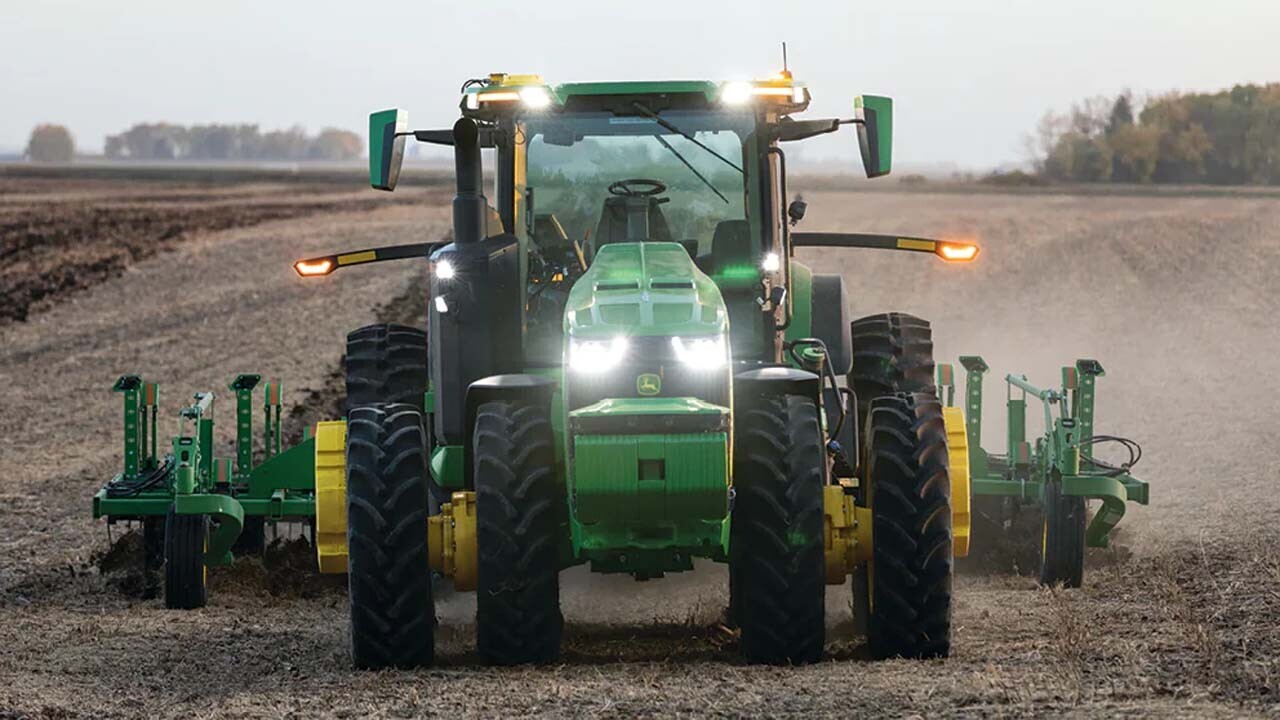
John Deere has been in business for nearly 200 years. For those in the agriculture industry, the company that makes green tractors is as well-known as Santa Claus, McDonald’s, or John Wayne.
Heck, even city folk who’ve never seen a tractor that wasn’t on a television screen know John Deere. The company’s so popular even celebrities such as Ashton Kutcher and George Clooney have been known to rock a Deere hat.
What most outsiders don’t know is that John Deere’s not so much a farming vehicle manufacturer these days as it is an agricultural technology company. And, judging by how things are going in 2022, we’re predicting it’ll be a full-on artificial intelligence company within the next 15 years.
Watch out Silicon Valley
John Deere’s been heavily-invested in robotics and autonomy for decades. Back in the late 1990s, the company acquired GPS startup NavCon in hopes of building satellite-directed guidance systems for tractors.
Within a few years, JD was able to develop a system that was accurate to a few centimeters — previous GPS systems could be off by as much as several meters.
The company then partnered with none other than NASA to create the world’s first internet-based GPS tracking system.
In other words: the path to modern autonomous vehicles was sowed and tilled by John Deer tractors and NASA decades ago.
Automation is par for the course at John Deere. The company has numerous tractors, vehicles, and other smart equipment that offer features ranging from hands-free driver assistance to autonomous weed identification and eradication.
But the recent shift to autonomy has the company positioned to be an important fixture in the AI technology sector.
I spoke to John Deere’s VP of autonomy and automation, Jorge Heraud, to find out exactly what we could expect from the first name in self-driving tractors in the future.
Heraud explained that John Deere approached artificial intelligence technology from two angles:
There’s automation, making machines achieve superhuman performance. And autonomy, making vehicles driverless.
Farmers have long relied on Deere’s automation technologies — the superhuman machines Heraud mentioned.
As an example of this kind of tech, Heraud mentioned AI-powered systems to identify and cull weeds in real time.
It sounds like a simple problem, but nobody wants to spray an entire field with pesticide. And sending humans out to weed thousands of acres by hand is incredibly cost and labor-prohibitive.
But, if your farm vehicles can handle weeding in real-time while they’re doing other tasks autonomously, such as tilling, then farmers save time and labor while simultaneously increasing outputs for current and future crops.
On the other side, is autonomy and John Deere’s fascinating driverless tractors.
Behold the 8R:
According to Heraud, this is unlike any other AI-powered tractor the company produces:
This is super exciting. It’s not just driver assistance … the farmer can go and do something else. They can leave the cab and operate everything from an app.
Where previous AI-assistance systems would handle turns and keep rows straight, farmers were still needed in the cab to deal with obstacles, mud, and other little surprises that may crop up.
Now, the 8R can find its way to a field and operate entirely on its own without a human in sight. If it does come across something it doesn’t know how to handle, it alerts the human who can then direct it to avoid the object or come handle the situation personally if need be.
Beyond robo-tractors
Currently the fully-autonomous 8R is set up for tilling, a labor-intensive facet of farming that’s crucial to a farm’s harvest.
Heraud told me that, specifically for corn and soy, farmers across the US often struggle to find labor during peak harvesting months.
In the wake of COVID-19 and pandemic-related travel restrictions, seasonal and migratory workers have been harder to find and farmers are struggling to maintain their fields.
Heraud described the issue as critical. He says the 8R can be a game-changer at harvest time, especially when it comes to getting fields ready for the next planting.
But the company’s ambitions don’t end there. The “future of farming,” as John Deere calls it, will apparently be a robotic revolution.
Deere currently has plans to automate nearly everything on a farm that has a motor — if the company sells it, there’s a good chance they’re trying to turn it into an autonomous robot.
When I asked Heraud if the “fully-automated farm of the future” was something that would arrive within the next decade or two, he replied:
It’ll be here before the end of the decade.
Get the TNW newsletter
Get the most important tech news in your inbox each week.




